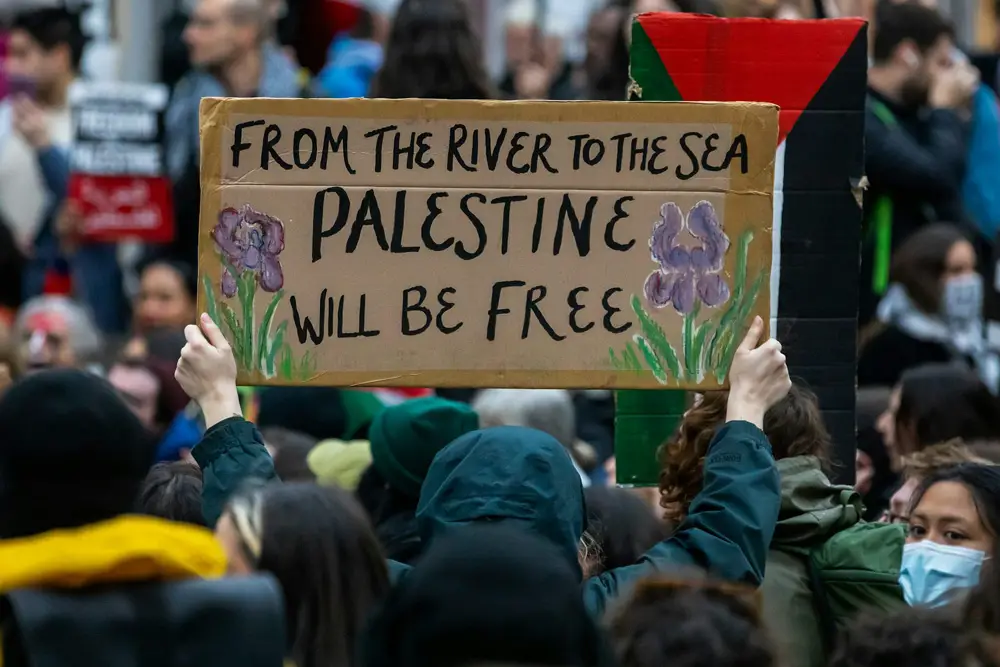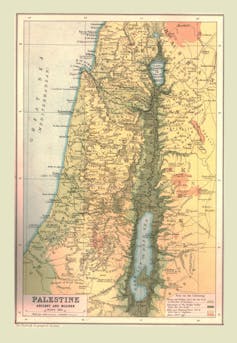
By Maha Nassar
What does the call “From the river to the sea, Palestine will be free” mean to Palestinians who say it? And why do they keep using the slogan despite the controversy that surrounds its use?
As both a scholar of Palestinian history and someone from the Palestinian diaspora, I have observed the decades-old phrase gain new life – and scrutiny – in the massive pro-Palestinian marches in the U.S. and around the world that have occurred during the Israeli bombing campaign in the Gaza Strip in retaliation for Hamas’ Oct. 7 attack on Israel.
Pro-Israel groups, including the U.S.-based Anti-Defamation League, have labeled the phrase “antisemitic.” It has even led to a rare censure of House Rep. Rashida Tlaib, the only Palestinian-American member of Congress, for using the phrase.
But to Tlaib, and countless others, the phrase isn’t antisemitic at all. Rather, it is, in Tlaib’s words, “an aspirational call for freedom, human rights and peaceful coexistence.”
I cannot speak to what is in the heart of every person who uses the phrase. But I can speak to what the phrase has meant to various groups of Palestinians throughout history, and the intent behind most people who use it today.
Simply put, the majority of Palestinians who use this phrase do so because they believe that, in 10 short words, it sums up their personal ties, their national rights and their vision for the land they call Palestine. And while attempts to police the slogan’s use may come from a place of genuine concern, there is a risk that tarring the slogan as antisemitic – and therefore beyond the pale – taps into a longer history of attempts to silence Palestinian voices.
An expression of personal ties
One reason for the phrase’s appeal is that it speaks to Palestinians’ deep personal ties to the land. They have long identified themselves – and one another – by the town or village in Palestine from which they came.

The Print Collector/Getty Images
And those places stretched across the land, from Jericho and Safed near the Jordan River in the east, to Jaffa and Haifa on the shores of the Mediterranean Sea in the west.
These deeply personal ties were passed down over generations through clothing, cuisine and subtle differences in Arabic dialects that are specific to locations within Palestine.
And those ties continue today. Children and grandchildren of Palestinian refugees often feel a personal connection to the specific places their ancestors hailed from.
A demand for national rights
But the phrase is not simply a reference to geography. It’s political.
“From the river to the sea” also seeks to reaffirm Palestinians’ national rights over their homeland and a desire for a unified Palestine to form the basis of an independent state.
When Palestine was under British colonial rule from 1917 to 1948, its Arab inhabitants objected strongly to partition proposals advocated by British and Zionist interests. That’s because, buried deep in the proposals, were stipulations that would have forced hundreds of thousands of Palestinian Arabs off their ancestral lands.
In 1946, the Delegation of Arab Governments proposed instead a “unitary state” with a “democratic constitution” that would guarantee “freedom of religious practice” for all and would recognize “the right of Jews to employ the Hebrew language as a second official language.”
The following year, the United Nations instead approved a partition plan for Palestine, which would have forced 500,000 Palestinian Arabs living in the proposed Jewish state to choose between living as a minority in their own country or leaving.
It’s in this context that the call for a unified, independent Palestine emerges, according to Arabic scholar Elliott Colla.
During the 1948 war that led to the formation of the state of Israel, around 750,000 Palestinian Arabs fled or were expelled from their villages and towns. By the end of the war, Palestine was split into three: 78% of the land became part of the Jewish state of Israel, while the remainder fell under Jordanian or Egyptian rule.
Palestinian refugees believed they had a right to return to their homes in the new state of Israel. Israeli leaders, seeking to maintain the state’s Jewish majority, sought to have the refugees resettled far away. Meanwhile, a narrative emerged in the West in the 1950s claiming that Palestinians’ political claims were invalid.
Future vision
Palestinians had to find a way to both assert their national rights and lay out an alternative vision for peace. After Israel occupied the West Bank, East Jerusalem and Gaza Strip in the 1967 Arab-Israeli War, the call for a free Palestine “from the river to the sea” started to gain traction among those who believed that all the land should be returned to the Palestinians.
But it soon also came to represent the vision of a secular democratic state with equality for all.
In 1969, the Palestinian National Council, the highest decision-making body of the Palestinians in exile, formally called for a “Palestinian democratic state” that would be “free of all forms of religious and social discrimination.”
This remained a popular vision among Palestinians, even as some of their leaders inched toward the idea of establishing a truncated Palestinian state alongside Israel in the West Bank, Gaza Strip and East Jerusalem.
Many Palestinians were skeptical of this two-state solution. For refugees exiled since 1948, a two-state solution would not allow them to return to their towns and villages in Israel. Some Palestinian citizens of Israel feared that a two-state solution would leave them even more isolated as an Arab minority in a Jewish state.
Even Palestinians in the West Bank and Gaza Strip – those who stood the most to gain from a two-state solution – were lukewarm to the idea. A 1986 poll found that 78% of respondents “supported the establishment of a democratic-secular Palestinian state encompassing all of Palestine,” while only 17% supported two states.
That helps explains why the call for a free Palestine “from the river to the sea” became popular in the protest chants of the First Intifada, or Palestinian uprising, from 1987 to 1992.
Notably, Hamas, an Islamist party founded in 1987, did not initially use “from the river to the sea,” likely due to the phrase’s long-standing ties to Palestinian secular nationalism.
Two states or one?
The 1993 signing of the Oslo Accords led many to believe that a two-state solution was just around the corner.
But as hopes for a two-state solution dimmed, some Palestinians returned to the idea of a single, democratic state from the river to the sea.
Meanwhile, Hamas picked up the slogan, adding the phrase “from the river to the sea” to its 2017 revised charter. The language was part of Hamas’ broader efforts to gain legitimacy at the expense of its secular rival, Fatah, which was seen by many as having failed the Palestinian people.
Today, broad swaths of Palestinians still favor the idea of equality. A 2022 poll found strong support among Palestinians for the idea of a single state with equal rights for all.
Offensive phrase?
Perhaps colored by Hamas’ use of the phrase, some have claimed it is a genocidal call – the implication being that the slogan’s end is calling for Palestine to be “free from Jews.” It’s understandable where such fears come from, given the Hamas attacks on Oct. 7 that killed 1,200 people, according to the Israeli foreign ministry.
But the Arabic original, “Filastin hurra,” means liberated Palestine. “Free from” would be a different Arabic word altogether.
Other critics of the slogan insist that by denying Israel’s right to exist as a Jewish state, the phrase itself is antisemitic. Under such thinking, protesters should instead be calling for a Palestinian state that exists alongside Israel – and not one that replaces it.
But this would seemingly ignore the current reality. There is strong scholarly consensus that a two-state solution is no longer viable. They argue that the extent of settlement building in the West Bank and the economic conditions in Gaza have eaten away at the cohesion and viability of any envisioned Palestinian state.
Further demonization
There is another argument against the slogan’s use: That while not antisemitic in itself, the fact that some Jewish people see it that way – and as such see it as a threat – is enough for people to abandon its use.
But such an argument would, I contend, privilege the feelings of one group over that of another. And it risks further demonizing and silencing Palestinian voices in the West.

AP Photo/Amanda Andrade-Rhoades
Over the last month, Europe has seen what pro-Palestine advocates describe as an “unprecedented crackdown” on their activism. Meanwhile, people across the U.S. are reporting widespread discrimination, retaliation and punishment for their pro-Palestinian views.
On Nov. 14, George Washington University suspended the student group Students for Justice in Palestine, in part because the group projected the slogan “Free Palestine From the River to the Sea” on the campus library.
Principle, not platform
None of this is to say that the phrase “From the river to the sea, Palestine will be free” doesn’t have multiple interpretations.
Palestinians themselves are divided over the specific political outcome they wish to see in their homeland.
But that misses the point. Most Palestinians using this chant do not see it as advocating for a specific political platform or as belonging to a specific political group. Rather, the majority of people using the phrase see it as a principled vision of freedom and coexistence.
![]()
Maha Nassar is Associate Professor in the School of Middle Eastern and North African Studies at the University of Arizona.





























DaleL says
The meanings of words and phrases change over time. For example, there are numerous terms that were once considered acceptable to identify the race of people who are African American. Not so much anymore.
The goal of Hamas is the extermination of Israel and the deportation and/or murder of all the Jews who live in Israel. Hamas incorporated the phrase “From the River to the Sea” into its 2017 constitution. As a result, the phrase is associated with the goals of Hamas and it is anti-Semitic.
Maha Nassar also ignores the number of Jews who had to flee their homes and relocate to either Israel or Europe because of Arab violence. The number is almost the same as that of the Muslims who were displaced with the creation of Israel.
Engin.Rusllpostur says
Putting all religious issues aside, what makes the outcome of the 1948 war reversible. If that were the way society has worked, then why haven’t all lands that changed hands after a war be returned to original owner? Should The map of the world should be redrawn to pre world war status? Should we return the USA to UK and the return it all to Spain and then return all that to the native population of the Americas?
Why is Israel required to return to the historical map. This question does not address politics, religion or what the losing parties want. War stinks. It always has and always will. The idea of a “fair “ war is just absurd.
Ray W. says
Winston Churchill as said to have commented that it is better to jaw-jaw than to war-war. Diplomacy, even to Churchill in an era of diplomatic surrender to the Nazis, was preferable to never-ending war. Potsdam, Yalta, Teheran, all were efforts to develop a conforming response to the Axis powers. It isn’t a binary issue of either give land back or keep it in Palestine; it is an issue of never-ending and ever-escalating war. In this scenario, a binary approach to the slaughters of today and tomorrow is a limiting approach, which hasn’t worked in 75 years of Israeli statehood. In this scenario, the multifaceted issue of negotiating some form of peace, with everything on the table, might be the best of hundreds of different choices.
I am not arguing that peace can ever be achieved in Palestine. I am not convinced that either of the two major indigenous Palestinian groups has a populace sufficiently motivated to engage in the peace process without great risk of sacrificing the governments they currently have. However, Israel has to have an experienced and sufficiently well-educated segment of society that understands that the current state of affairs cannot be sustained for years, much less decades.
When you add up the portions of the economies of Iran, Iraq, Turkey, Syria, Lebanon, Jordan and Egypt that can be devoted to armaments, and when you consider that each of those nations is being pressed by their citizenry to be openly critical of the IDF response to the October 7th massacre of some 1400 Israelis, then you have to consider that Israel is seriously outgunned and outmanned and that in war, the past successes of the IDF are a footnote in history. If the governments of the Arab and Persian countries are forced by their peoples to address the Palestinian issue by force, then who knows what the outcome will be and how long it will take to reach that outcome? The only thing that is certain is that no one will win. Is Israel really prepared to defend against hordes of Palestinian-controlled drones dropping explosives onto settler homes in the West Bank 10 years from now? We can all see what is happening in the Ukraine. As the Ukrainian Army evolves and develops its drone corps, the Russians on the front lines are never free from fear of armaments dropping from above. Newly developed Ukrainian drone ships are sinking Russian Federation naval vessels. Every military in the world knows what is coming. The future is now, and it is remote warfare, and the Ukrainian military is the tip of that spear.
No government in its right mind would continuously antagonize hundreds of millions of angry Arabs and Persians by killing more and more civilians, day after day, much less starving them of food and fuel, and risk the chaos that would come if Middle Eastern governments were forced by their respective populaces to band together against Israel. Israel’s stance on the Gaza Strip is already evolving in the face of these pressures; it will evolve more in the future.
It is better to jaw-jaw than to war-war, mainly because even the least sophisticated peoples of the world have learned how to be pretty good at war-war.
Samuel L. Bronkowitz says
Great article, with actual research into the historical origins of the phrase and what is means, as opposed to anti-islamic nonsense cached in specious claims of antisemitism. A refreshing change.